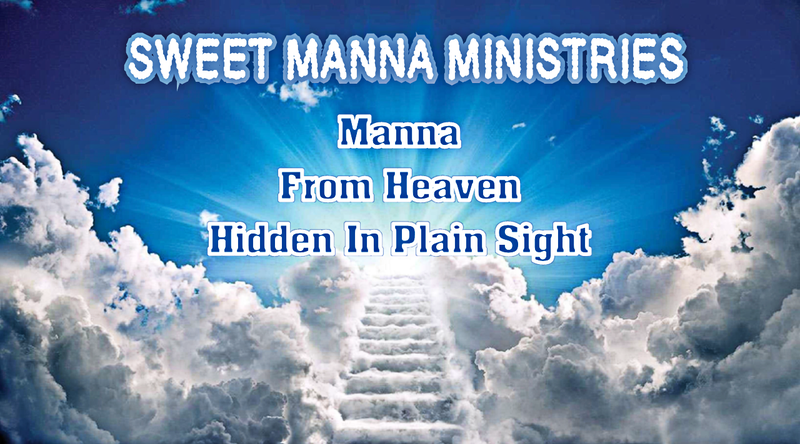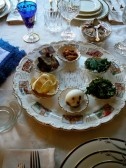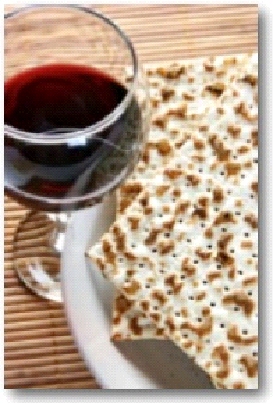The Teaching Ministry of
Rev. Marjorie Kummrow
Bible Studies
This ministry has made a choice to be "Biblically correct" as opposed to "politically correct" therefore we have forfeited the non-profit status available to us. Please note that all donations to this ministry are not tax deductible. Thank you for your support.
The Ritual Order of the Seder - Part 8
This is the order of the ritual meal for the Seder Service:
1. Kaddesh (the blessing and praying over the cup) and the drinking of first cup. The first cup of wine is blessed and drunk. This first cup of wine is called the Cup of Salvation or Sanctification. “I will bring you out from under the burdens” The Hebrew root word for burdens is the word sēbel it means burden or load. This symbolizes that the Lord has freed us from all our burdens and the cares of this world. His yoke is easy and He is our burden bearer carrying our load. The blessing that is said over the wine is: “Blessed are You, Lord our God, King of the Universe, who creates the fruit of the vine”. It was during this meal that Yeshua referred to Himself as being the true
vine.17 John records quite a long discourse from Yeshua during the meal. After all it would be their last Seder meal together and He had much He wanted to tell them.
2. Ur’Chaz is the ritual washing of the hands, when this is done at this point there is no blessing that is recited. This may have been where Yeshua, (Jesus) extended the hand washing ritual to a foot washing ritual. It was customary for the servants of a household to wash the feet of the guests when they arrived. Since Yeshua was painting a picture and making a statement about servitude, it may very well have been done at this point.
3. Karpas the word means parsley or green herbs. A small bowl of salt water is provided to dip a green vegetable in such as parsley and then eat it. The green vegetable represents freedom and new life that sprouts through in the spring of the year. Dipping it in the salt water represents the tears of slavery and the tears of repentance.
4. Yachatz is the breaking of the bread, which is Matzah and the hiding of the afikomen. This is described in detail a little later in our studies.
5. The Maggid is the telling of the story of the Exodus and the drinking of the second cup.. The children in the home are involved in the story telling by asking questions. There are 4 questions that are asked. They are as follows: Why on all other nights do we eat leavened or unleavened bread, but on this night only unleavened? Why on all other nights do we eat all kinds of herbs but on this night only bitter? Why on all other nights we never dip but on this night we dip twice? Why on all other nights we eat sitting but on this night we recline? The answers to these questions are revealed in the Seder meal itself.
The second cup of wine is the Cup of Deliverance. “I will rescue you from their bondage”. The Hebrew word for bondage is the word abodah and it means “work of any kind”. This refers to the bondage of slavery and to the release from bondage of being slaves to sin, that the Lord has provided for us in Himself. No amount of work can earn our salvation. It is a free gift. This cup is lifted and a blessing is said over it. “Blessed are You, O LORD our God, King of the Universe, Who redeemed us from Egypt with Your outstretched arm and by the blood of the Lamb”. The second cup was also called a Cup of Wrath. Edward Chumney in his book says that this second cup of wrath is not drunk, but instead it is spilled out on the table .18 I have not found any accounts to confirm this as a practice at the Seder meal before Yeshua’s death. The practice of it today signifies the joy of the vine being diminished; due to the suffering of our enemies. Today just a few drops are spilled from the cup signifying that our joy cannot be full when others suffer and our lost.
6. Rachtzah is another ritual washing of the hands that is done before the meal. This is done with the following blessing. Blessed are You O Lord our God, who has sanctified us by His commandments and has commanded us regarding the washing of hands.
7. Motzi is the blessing over the bread as follows: “Blessed are You, Lord our God, King of the Universe, who brings forth the bread from the earth”. This is an obvious prophecy of Yeshua, the bread of life, being brought forth from the depths of the earth into resurrected life.
8. Matzah is the unleavened bread, it is blessed and eaten. The blessing is: Blessed are You, O LORD our God, King of the Universe, Who has sanctified us with His commandments and has commanded us regarding eating matzah.
9. Maror is bitter herbs. Usually this is symbolized by horseradish. This is eaten in remembrance of the bitterness of sin and the bitterness of the slavery in Egypt. A piece of Matzah is taken and dipped into the horseradish and eaten. This may be the point when Judas who sat at Yeshua’s right dipped into the same bowl as Yeshua, identifying that he was the one that would betray his master. 19
10. Korech is when a sandwich is made of the bread (matzah) and the bitter herbs (maror) and then eaten. This is done in fulfillment of the scripture verse: “They shall eat it with unleavened bread and bitter herbs.”20
11. Shulchan Orech is the serving of the main meal. It is the time to feast and enjoy the fellowship of one another and celebrate the freedom that the Lord has provided.
12. Tzafun is when the dessert bread or the afikoman that has been hidden is found and eaten. It is eaten with the third cup after the meal. There is more to learn about the afikoman and this third cup and it will follow later in this study.
13. Barech is the grace after the meal, and a blessing over the third cup. The third cup is the cup of redemption and it is drunk at this point after the meal.
14. Hallel is the point in the ritual that songs of praise are sung or chanted. The participants would have sung Psalms 113-117 during the Seder. At this point the 4th cup of wine is poured and a door is opened for Elijah to enter and proclaim the coming of the Messiah. Much more is to follow on the significance of this cup.
15. Nirtzah indicates that all is finished. The final song which is Psalm 118 would have been sung. We are told that after the meal Yeshua and his disciples sang a hymn and then they went out to the Mount of Olives.21 Take time to read these Psalms 113-118 and put yourself in the setting that our Lord was in as he joined in the chorus with His disciples as they all sang about salvation or should I say, all about Yeshua.
The Seder ritual today has had more symbolic foods added to the meal. As far as we know the 15 steps of the Seder that is outlined in this study is the more simplistic meal that was celebrated at the time of Yeshua.
17 John 15:1
18 The Seven Festivals of the Messiah, Edward Chumney
19 Matt 26:23
20 Ex 12:8
21 Mark 14:26
To continue with Part 9 of this series, click on "The Cup of Redemption and the Afikoman "
If you have any questions, please feel free to email us.
Be Blessed,
Rev. Marjorie
marjorie@sweetmanna.org
Contact us to be put on our email list at mailinglist@sweetmanna.org or make a prayer request at prayerwarrior@sweetmanna.org
The Spring Feasts
The Ritual Order of the Seder
Part 8
Yeshua (Jesus) said that He looked forward with great anticipation to sharing this Seder meal with His disciples. These celebrations were a joyous time of fellowship, laughter, and singing of songs. It was a party! Since it was a ritual meal, there was a certain order to the meal, just as there is today. Wine in the bible is symbolic of joy and there were 4 cups of wine served at this meal. The first two cups are drunk before the meal and then two cups are drunk after the meal. The 4 cups represent the 4 stages of deliverance found in Exodus as follows:
Exodus 6:6-7(NKJV) Therefore say to the children of Israel: 'I am the LORD; I will bring you out from under the burdens of the Egyptians, I will rescue you from their bondage, and I will redeem you with an outstretched arm and with great judgments. 7 I will take you as My people, and I will be your God. Then you shall know that I am the LORD your God who brings you out from under the burdens of the Egyptians.


